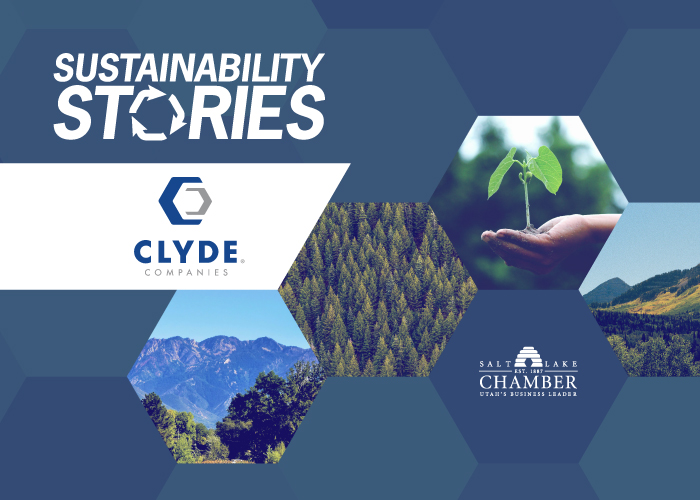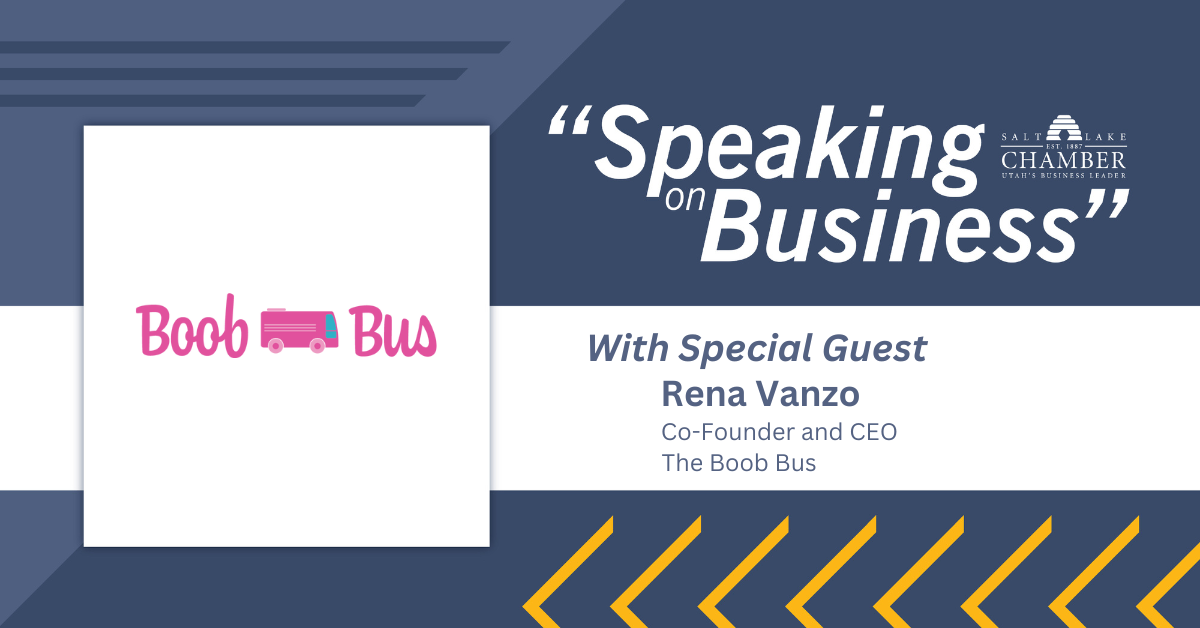In the modern economy, environmental sustainability is one factor in how businesses can stand out and thrive. Each month, the Salt Lake Chamber will highlight a Utah business making positive strides for the environment and our natural resources to encourage support and innovation.
Our feature, Clyde Companies, has a long-standing commitment to sustainability, with a focus on building an industry that supports and achieves sustainable development. We asked Chief Strategy & Marketing Officer, Ally Isom, a series of questions about their sustainability practices.
Clyde Companies has been taking steps toward sustainability since 1954, when they started diverting construction waste from landfills. Do you know how and why that started so early in terms of business sustainability initiatives?
Looking back through the Clyde Companies archives, you’ll see a principle of responsible stewardship over resources and land, where we made the most of what we had while we were building the company into what it is today.
Recycling material just made good business sense then, as it does now. And it aligns with our values at Clyde Companies, especially our value of continuous improvement. The greatest cost in providing material is often transporting that material, so keeping raw material onsite and re-using it onsite is often most cost-effective.
What has the customer response been to your sustainability initiatives?
Clyde Companies’ biggest customers are the communities where we live and work, and we know responsible stewardship is critical for every community. It’s actually a requirement for many public projects because it saves taxpayers money.
But our efforts do occasionally turn heads. A government agency requested a visit to see our concrete washout system — not for an inspection, but to see our design that saves thousands of gallons of water every day, uses minimal electricity and settles and separates water from sediments, then we can use those sediments to build block products. They were blown away by our investment to do it right, to reuse resources and innovate. It’s a win-win for our environment and for our customers.
Tell me more about your Reliance Software System. How was that developed?
Clyde Companies has a data-centric approach to measuring and improving our environmental impact. We want to do the right thing and we’ve made a serious investment that shows our commitment to sustainable stewardship.
We created a proprietary method called the Reliance Software System. Reliance allows us to track and monitor our performance with regard to permit standards, so we ensure in real time we are fully compliant with state and federal environmental standards. Reliance also has a built-in alert system. That alert system allows us to be proactive and strategic, rather than reactive. It notifies our operations leaders if readings approach limits. Then we are more nimble and responsive as conditions change.
It also means we can provide state and federal inspectors immediate and impressive results. We frequently hear from inspectors that no other company within our industry has this level of sophistication in their environmental impact tracking.
Why is sustainability so important to a long-term business strategy?
Many people mistake sustainability for added cost and time lost. But if something is truly sustainable, it makes sound financial sense in the long run. Sustainability and financial return go hand-in-hand.
The more efficient our equipment, operations and fleet are, the better we do financially. One strategic example is local sourcing of aggregates and raw materials for community projects and home construction. When our sand and gravel operations are near where the work takes place, it is a win for all involved. Transportation can be a huge cost-driver. Closer material means fewer heavy trucks on the road, and that means less traffic congestion, less air pollution and less wear and tear on public infrastructure. It’s a benefit all around. When raw material like aggregate has to be hauled farther, homes cost more, public infrastructure costs more and hospitals and schools cost more.
Can I share a great example from just one project? One of our companies, WW Clyde, replaced a section of airstrip in Cheyenne, Wyoming. We first removed the section of old airstrip, then instead of hauling tons of old concrete to a landfill, we recycled it on site. We used some of the recycled concrete for the new section of airstrip, and the airport later used the material for a new parking lot. A win for the customer. A win for our planet.
What advice would you give to other businesses wanting to improve their sustainability efforts?
In 2026, Clyde Companies will celebrate 100 years of building a better community. Not many
organizations can say they’ve been around for a century. That 100-year track record demonstrates continual improvement, innovation and high standards for excellence – not just for ourselves, but for our industry.
Smart business done right means playing the long game. Don’t be afraid to make long-term
sustainability investments to do things the right way. It could actually be your competitive advantage as your customers seek sustainable solutions. Clyde Companies believes it pays off, both for our greater community and for our business.
Do you have a favorite simple strategy to be sustainable in your own life?
I grew up in a home with pretty limited means, so we just didn’t waste anything. I thrifted before thrifting was cool. My mom actually washed and reused plastic bags and aluminum foil because she understood there was still utility in the object and no need to create something new. As a result, I think I’m more averse to over-the-top commercialism and waste, and I’m a big fan of second-hand and consignment for a range of home goods and apparel.
To read other sustainability stories, click here.


